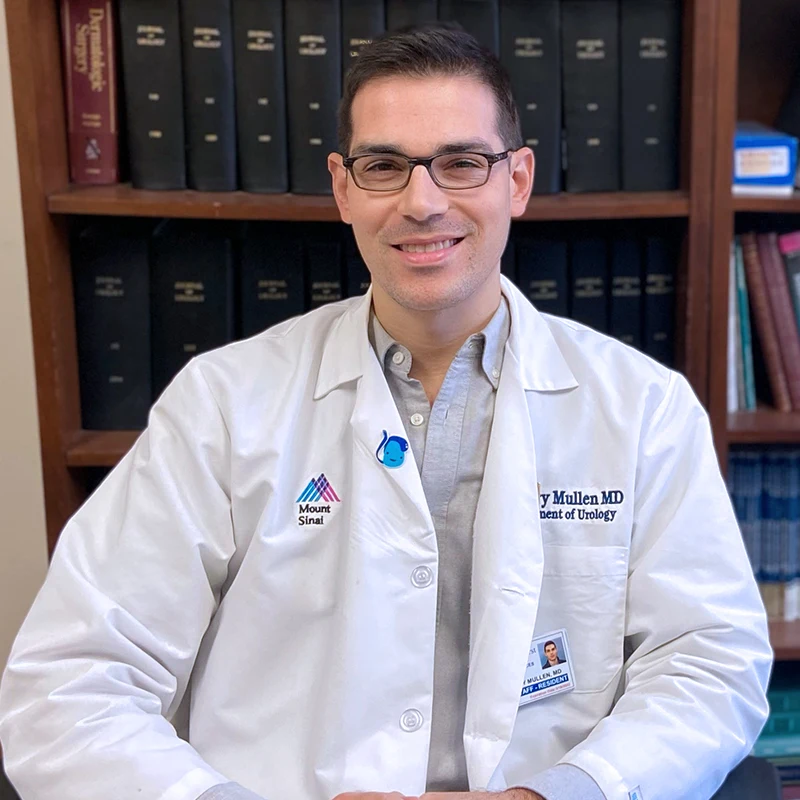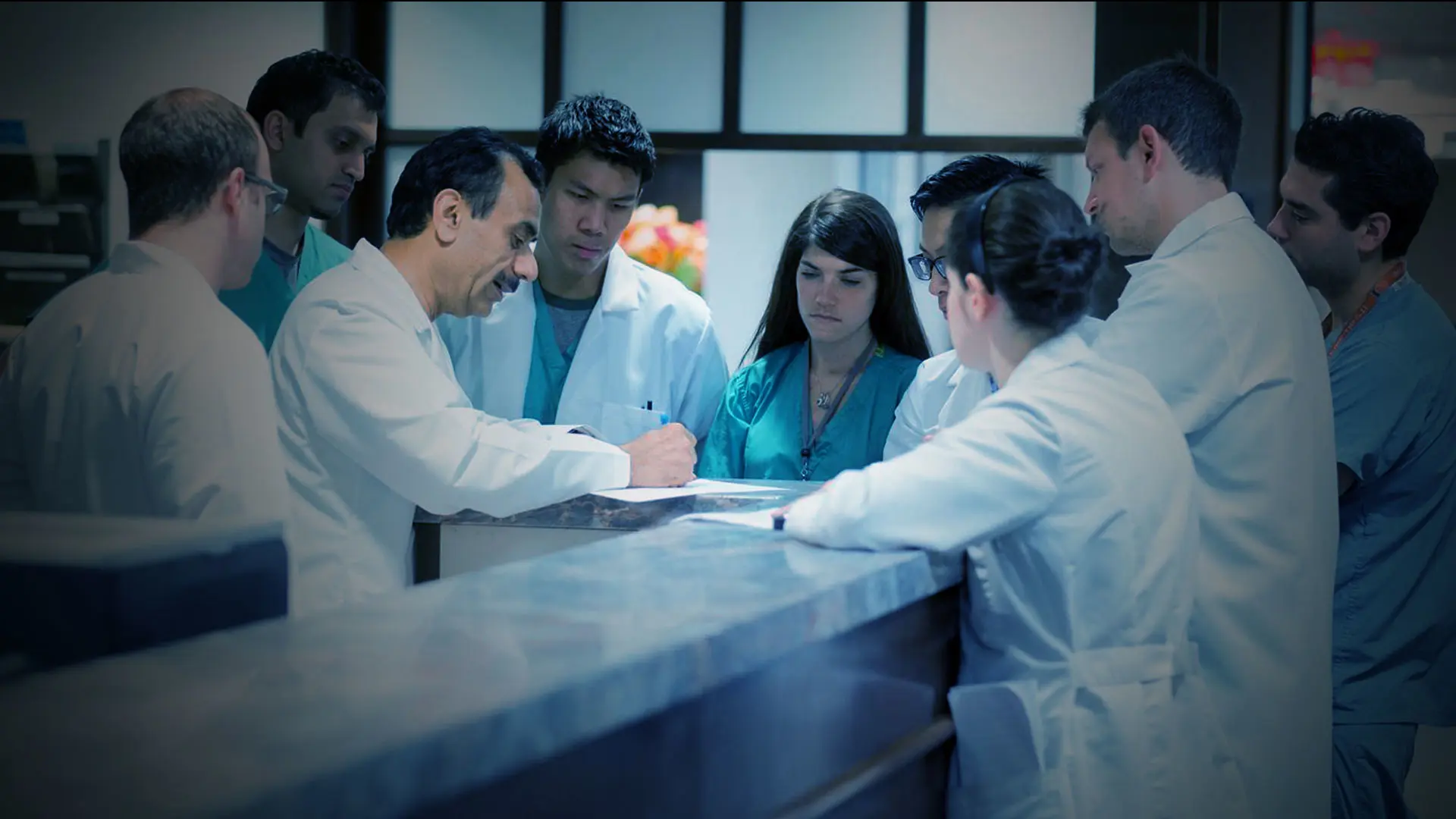The Urology Residency Program of the Department of Urology at the Icahn School of Medicine at Mount Sinai trains residents in all aspects of the medical and surgical evaluation and treatment of genitourinary disease, and offers residents the resources of the largest network of hospitals in New York.
The breadth and depth of the program is unique, offering trainees expertise in virtually every subspecialty, residents say.
When it came time to start his residency training in urology, Gregory Mullen, MD, says there was no institution that quite compared with Mount Sinai.
“There are leaders in robotic kidney, bladder, and prostate surgery. There is a legacy of innovation in managing highly complex kidney stone cases,” says Dr. Mullen, a chief resident and one of 24 trainees enrolled in Mount Sinai’s program, which recruits five trainees per year through the American Urological Association Residency Match. “Urologists here are also doing incredible work in areas such as penile prosthetics and transgender surgery.”
For Dr. Mullen, the experience has been rewarding in several ways. For one, he experienced no pressure in selecting his area of specialization, which enabled him to explore all aspects of urology to find his passion. He also connected with a wide range of mentors and peers who not only provided a sense of community but also guidance in choosing his subspecialty—complex kidney stones. Those efforts were helped in part by the introduction of a formal mentorship program during his residency that connects trainees with faculty.
“It is somewhat casual in that you can meet with mentors for coffee, but it is also fluid,” he says. “During your residency, you cycle through different Mount Sinai sites every 10 to 12 weeks, which means you can have at least three or four mentors each year.”
Another strength of the program is that all urology residents are encouraged to participate in or launch their own research projects.
Residents are currently exploring a wide range of urology-related issues such as the impact of COVID-19 on urologic oncology; survival outcomes among patients with kidney and urothelial cancer; the contribution of nerves to prostate cancer; and new treatments and technologies for female sexual dysfunction. Dr. Mullen’s research involves the surgical and medical management of urolithiasis and voiding dysfunction, which has led to manuscripts with Mantu Gupta, MD, and Steven Kaplan, MD, both Professor of Urology.
“The resources that are at your disposal at Mount Sinai are limitless,” Dr. Mullen says. “Whether it is faculty, statisticians, or librarians, you always have access to someone who can assist you in your efforts. The faculty we work with are world-renowned in their subspecialties, which creates opportunities for you to participate in conferences and present your research, which is an invaluable experience.”

Gregory Mullen, MD, a chief resident and one of 24 trainees enrolled in Mount Sinai’s program
Perhaps the most important aspect of the Mount Sinai urology residency is the opportunity for hands-on experience during rotations, specifically at Elmhurst Hospital Center in Queens, New York, one of six locations where rotations take place.
“It is a phenomenal experience,” he says. “You are seeing patients in the clinic, performing their surgeries, following up the pathology, and managing their care among other responsibilities.”
Ultimately, Dr. Mullen says the Mount Sinai residency has been exceptional, providing him with the knowledge and skills to successfully enter practice.
“Whether you envision going into private practice or academic practice, the level of training you receive here makes it possible for you to excel in any role or environment,” he says. “I am really fortunate I was able to do my residency here.”
Examples of Research
Chiefs:
Andrew Katims, MD, has done research on bladder cancer and urothelial cancer, with an emphasis recently on the impact of COVID on urologic oncology.
Andrew Tam, MD, has done research on kidney and urothelial cancer with an emphasis on survival outcomes.
Gregory Mullen, MD, has done research on the surgical and medical management of urolithiasis and voiding dysfunction.
PGY4s:
Shivaram Cumarasamy, MD, has done research in urologic oncology, with an emphasis on outcomes research and creating nomograms.
Shirin Razdan, MD, has done research on bladder cancer with an emphasis on reducing opioid use and preventing morbidity and mortality.
Harry Anastos, MD, has done research on urologic oncology and is now focusing on how to effectively and efficiently treat stones of the urinary tract.
PGY3s:
Ali Zalhalka, MD, is researching the contributions of nerves to prostate cancer and how to therapeutically target these interactions.
PGY2s:
Olamide Omidele, MD, has done research on kidney cancer with an emphasis on the role of robotic surgery.
Alexandra Siegal, MD, has done research on female sexual dysfunction with an emphasis on newer treatments and technologies.
Juan Serna, MD, has done research on endourologic surgeries with an emphasis on reducing opioid consumption.
PGY1s:
Nir Tomer, MD, has done research on ureteral stent encrustation with an emphasis on its pathophysiology and management.
